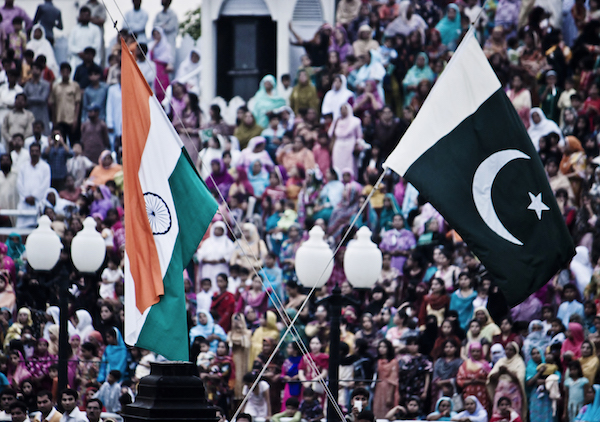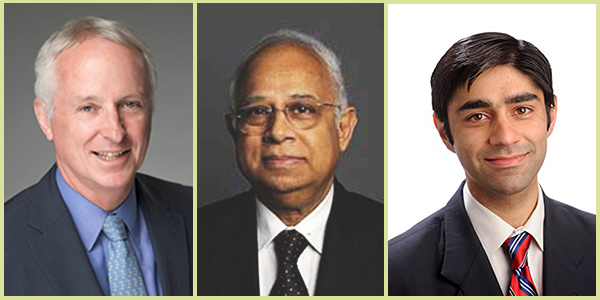Interview
Former United States Ambassador to Pakistan Cameron Munter, Chief Executive Officer and President of the East West Institute (EWI) hosted Ikram Sehgal, defense analyst and security expert, Chairman of Pathfinder Group Pakistan, which include two of the country’s largest Private security companies, Chairman Karachi Council on Foreign Relations, recently appointed Chairman of Karachi Electric Company, one of Pakistan’s major energy suppliers and also an active member of the Economic Forum at East west Institute having topic “South Asia in Flux” on 25th April 2019, to discuss The complex and ever-changing Power dynamics in South Asia.
Cameron Munter: South Asia geo political configuration makes it a key player at global power politics and security, given the regional tension in view what do you see as trajectory in South-Asia? Is the region on the right path?
A: I believe that the region is on the right path but in the wrong direction. One does not realize all the changes that have taken place, for instance just consider the Baghdad Pact has reversed itself. It was founded as a buffer to support other countries supported by the United States and many other western countries. If you look at South Asia, Pakistan has 3 identities South-Asian, Middle-Eastern and Central-Asian, we are a sort of floating bridge. This time when the entire region is in a flux with the One Belt, One Road and CPEC initiative, several changings are taking place within Arab countries on the other hand and Pakistan is not being able to take any side. So, we have situation where it can go really in any direction. For Pakistan at the moment things are working out very well because the long-standing proxy war that India stages against us first using Russian money and Russian lives and then American lives and American money is about to be over. A great symbol of that is the talk between the Taliban and the Unites States in which India has kept aside. Earlier, India was always considered as part of the equation but not anymore. I think changes are going to happen for the betterment of South-Asia in the long run.
Q) US and China are undergoing trade and diplomatic tensions. China is cooperating with Pakistan on militancy and it has made $60 billion investment in the name of CPEC. These factors are changing the dynamics of South Asia, when you look at CPEC and China, how do you asses China’s role not only in Pakistan but in the region?
A: Let us be very clear about it because Unites States controls the sea with, she seventh Fleet and the Fifth Fleet whereas China has no recourse but to rely on road and rail communication. If you look at the map it takes 45 days for a ship to reach from a Chinese port to European port. Even today, the road/ rail takes 15 days for a truck to get from Chinese port to reach Paris or near countries. The dynamics gets a change. Europe and Asia are one continent and with the Beit & Corridor initiative things are going towards prosperity. China understood that for seeable future there is no way that they would ever have a maritime equation to US at any time or even Japan which is also coming in line. It’s in China’s interest to ensure peace and tranquility, it is not in the interest of China to have great power rivals. China is doing the same thing that Pakistan is doing to balance its relationship with its neighbors Iran and Saudi Arabia. We have the largest Shia population in a minority in Pakistan that is 28%. In fact, we are the only country in the world that has a very well-integrated Muslim Army that has 30% Shias and 70% Sunnis. So, there is a balancing going on here in the region. While it is also in favor of Pakistan but it is more in the interest of China that this road comes
through because that is the lifeline of China. Without it, they can be choked out like Japan got choked out in the Second World War. I would take it is also in India’s interest to make a balance with China and US by not falling into one camp. It is the same with Pakistan as Pakistan cannot side line any major power be it either China or US, they need to keep the balance.
Q) How optimistic you are, when we see the Taliban and other players among the region, do you see in the efforts to bring some integration, is there any possibility of bringing Taliban on table where it can end the war?
A: Until the 18th century, South Asia was economically independent, it was exporting and it was one of the richest economic regions in the world. Once the British took over and changed the economy to their advantage, everything went hay-wire. it is the integrated economy if it can happen however the fact will remain that lot of depends on peace talks that is going on by US. I am very hopeful about what going on for a settlement. I think there are western interests in the Afghan regime which do not like a settlement. The future lies with the Afghans where the Taliban will not get all what they wanted. They have to compromise. If that happens, it is the real hope that things will work out. It is in the interest of Pakistan to bring India into the CPEC. Economically it is in the interest of Pakistan, militarily it is in the interest of Pakistan. It means if India comes into CPEC, it has to sort out its lingering issues on Kashmir, Kargil, Siachen, Runn of Kutch, and other places. But it is precisely what we have to look into – who wants peace in the region and it is who does not want peace into the region.
India has used the Afghanistan platform to fight their non-kinetic war against Pakistan. I think this has come to failure and things are going to be better soon. As I mentioned earlier, United States an: Taliban are having successful talks which will further pave way towards affluence.

Q) How do you see bilateral relation between India and Pakistan?
A: Very interestingly enough have at the moment recently finished a book on 1971 in which I have brought up the history. During the research, it has been found that: Pakistan was basically created due to the obduracy of Indian Congress they had accepted in the 1940s con-federations what would have been proposed all this would not have happened. If you now flash forward to Modi, he is taking India away from being a Secular State to a Hindi. State. If this happens, it will create quite some problems for confrontation initiated by nonstate-actors. If you look from a holistic point of view I think, Pakistan and India should really sit down together to decide what is in their interest, whatever our differences and not get involved in great power rivalries, do not get for-get those associations, keep them alive but do not let them interfere in the process of peace and friendship for economic benefits.
The interest of both countries lies with each other and whatever the difference are, we need to keep them aside and speak about things we have mutual interest in. We need visionary people to solve this problem amicably. Imran Khan is developing things toward that direction. In the last Pak-India crisis he showed maturity. He has shown not to be jingoistic. He has made it clear that the solution is not in war but in peace. Now it is the responsibly of Indian leadership as the next elected government to make efforts in bringing and maintaining peace in the region.




